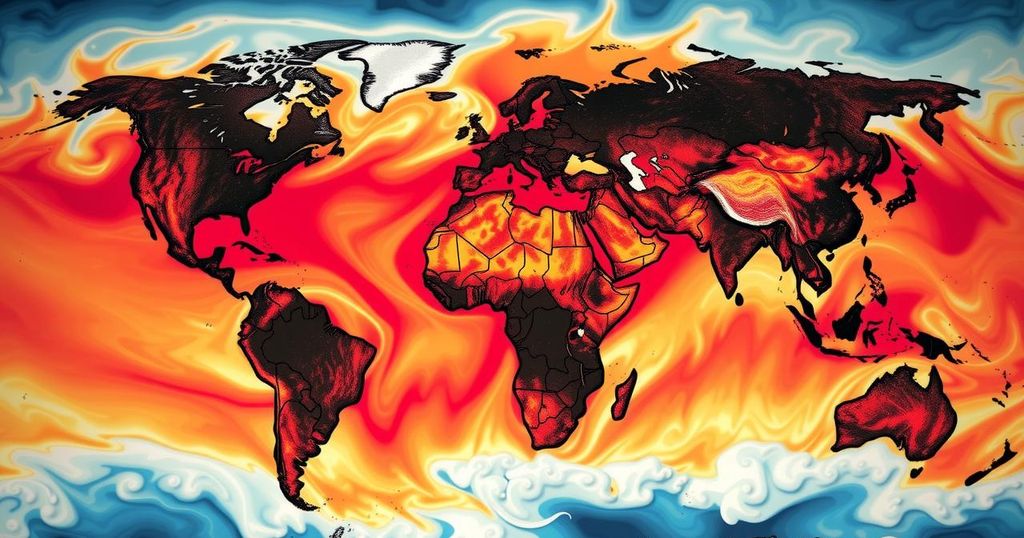In 2024, global temperatures reached 1.6°C above preindustrial levels, surpassing the 1.5°C threshold set by the Paris Agreement for the first time. This increase is linked to widespread extreme weather events, fueled primarily by fossil fuel consumption. The data highlights the urgent need for emissions reductions and a transition to renewable energy sources to combat the escalating climate crisis.
The year 2024 marked a significant milestone in climate history, as the global average temperature reached 1.6°C above preindustrial levels, surpassing the internationally recognized target of 1.5°C for the first time. This alarming rise, driven by extreme weather patterns linked to climate change, resulted in widespread human suffering and devastation. Data from the EU’s Copernicus Climate Change Service (C3S) indicates that on July 10, 2024, a record 44% of the planet experienced strong to extreme heat stress, while the hottest day in recorded history occurred just days later, on July 22. The causes of this extreme temperature increase are largely attributed to the persistent burning of fossil fuels, with scientists emphasizing the urgent need to transition towards renewable energy sources to avert further climatic calamities.
The significance of surpassing the 1.5°C threshold lies in its implications for future climate stability. While the Paris Agreement targets are evaluated over multi-year periods, the consistent breach of these limits showcases the escalating climate emergency. According to Dr. Samantha Burgess of C3S, “There is now an extremely high likelihood that we will overshoot the long-term average of 1.5°C in the Paris agreement limit.” The past decade has seen every year among the ten hottest since record-keeping began in 1850, highlighting a disturbing trend that requires immediate global action.
Scientifically, phenomena such as the El Niño climate variation contributed to the heightened temperatures observed in the first half of 2024. However, ongoing elevated temperatures even after El Niño’s effects diminished raise concerns among climatologists about potential unforeseen factors accelerating global warming. Recorded levels of atmospheric water vapor, which amplify rainfall and flooding, and the resultant impact on natural disasters serve as further evidence of worsening climate conditions. Prof. Joeri Rogelj notes that “Every fraction of a degree… brings more harm to people and ecosystems,” reiterating the critical need for emissions reductions.
Despite these alarming indicators, carbon emissions continue to rise, with 2024 projected to set new highs. This stark reality underlines the gap between national pledges made at recent climate conferences and the actual achievement of meaningful emissions reductions. As nations are expected to deliver revised emissions-cutting pledges to the UN in February, the urgency for effective climate action is more pressing than ever. Prof. Andrew Dessler succinctly stated, “Every year for the rest of your life will be one of the hottest [on] record,” stressing the inevitability of ongoing climate challenges unless significant emissions-related interventions are implemented.
In 2024, climate data revealed a troubling trend whereby global temperatures exceeded the 1.5°C threshold agreed upon in the Paris Agreement. This event symbolizes an intensification of the climate crisis, with repercussions that are far-reaching in terms of environmental degradation and human suffering. The surge in temperatures is primarily linked to human activities, particularly fossil fuel consumption, and underscores the urgent need for a global shift towards sustainable energy solutions. The increasing incidence of extreme weather events, including unprecedented droughts, floods, and hurricanes, exemplifies the stakes involved in addressing climate change effectively.
The surpassing of the 1.5°C target in 2024 is a clarion call for immediate climate action. The persistent rise in global temperatures and the subsequent increase in extreme weather events underscore the urgency of transitioning from fossil fuels to renewable energy. Scientific consensus indicates that if emissions do not significantly decline, humanity could face catastrophic climate consequences. Global leaders must commit to ambitious emissions reductions and seek sustainable pathways to mitigate the ongoing climate crisis.
Original Source: www.theguardian.com







